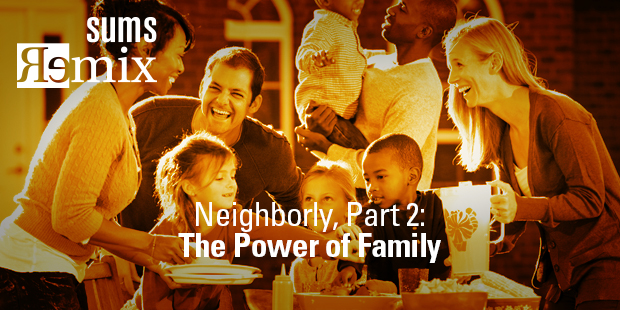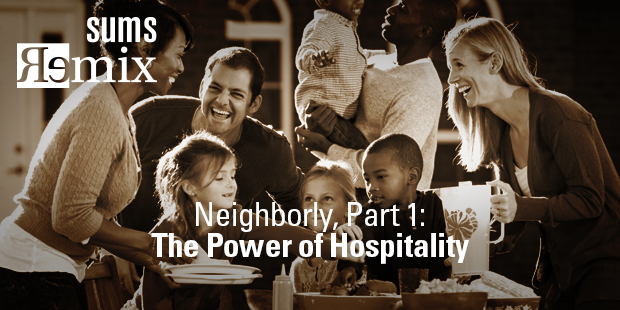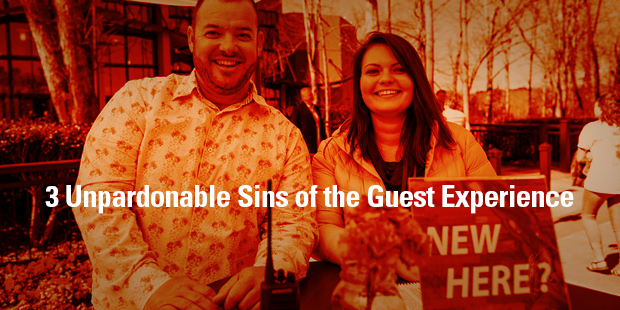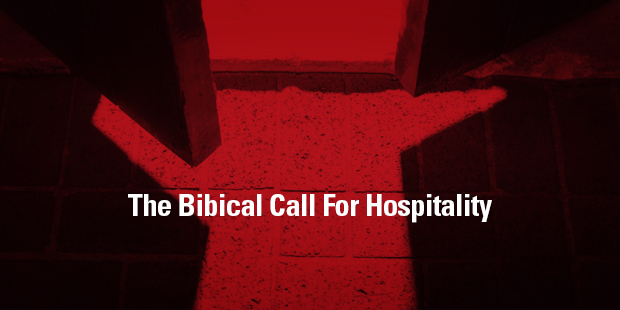The heart of God’s purpose for humankind is relationships – first, with God Himself; then, with one another. Arguably, there is no better place to build relationships than at the table with good food and great conversation.
Len Sweet, in his book From Tablet to Table states it eloquently:
Remember God’s first command in the Bible? Eat.
Remember God’s last command in the Bible? Drink.
And everything in between is a table – a life-course meal on which is served the very bread of life and cup of salvation.
It’s time to bring back the table to our homes, to our churches, and to our neighborhoods and the world.
The table is a recurring biblical theme, one that our fast-paced, drive-through, Instant Pot culture finds unfamiliar.
What would happen if we brought back the table as a sacred object of furniture in every home, church, and community?
Are we truly hungry to accept Jesus’ invitation – “Come and follow” – and to go wherever He leads, even if it means next door?
Especially if it means following Him next door!
What would it take for the table to return to the center of our family lives – and by extension, to those God has placed in our circle and situations?
SOLUTION #2: Radical hospitality extends your family
THE QUICK SUMMARY – Smart Compassion by Wesley Furlong
Smart Compassion calls Christians to strategic, prayerful, and biblically based approaches to compassion. With evangelical Anabaptist convictions and insights from psychology, Wesley Furlong uses his background as a church leader and nonprofit founder to guide readers through the three aspects of smart compassion needed for families and neighborhoods to flourish: collective empowerment, radical hospitality, and healing presence.
In the vein of When Helping Hurts, discover wise strategies that bring Jesus’ love to your neighbors. Shift your paradigm from fixing everybody’s problems to spending yourself well. Learn how to hold together justice and evangelism, worldly wisdom and divine revelation, action and prayer.
A SIMPLE SOLUTION
It’s one thing to read the Scriptures and reflect on Jesus’ question in the Parable of the Good Samaritan, “Which of these three do you think was a neighbor to the man who fell into the hands of robbers?”
It is another thing altogether to move from the concept of “who is our neighbor” to “who is our family?”
The willingness to inconvenience yourself for others is a priceless gift, and one of the greatest gifts we can give our communities is the gift of extended family.
We need people who put others first, leave space, and turn strangers into extended family members who quickly feel at home.
Radical hospitality is the opening of our lives and homes to embrace a stranger as extended family. It’s the soil where compassion flourishes.
The word hospitality may call to mind the idea of entertaining guests at nicely decorated dinner parties, but it once meant embracing a stranger as family, even when it was inconvenient and the house was dirty. It’s the high-level nurture, support, responsiveness, and availability that holds a family, neighborhood, and community together.
Radical doesn’t mean “extreme” as many people assume; it means “core.” Radical expressions of core commitments often appear extreme because they’re rarely followed through in practice.
Building on the principles of love, listen, discern, and respond, the acronym BREAD will introduce you to some perspectives and practices that can help you discern how best to embody the value of radical hospitality.
Begin with xenia – Xenos is the Greek word for “guest.” In the ancient world, xenia (hospitality) was a well-structured expectation. Jesus clearly established the practices of extending hospitality to strangers, healing the sick, and caring for the marginalized for his followers. It’s just what you do. It’s not a special calling; it’s part of the basic package when you say yes to Jesus.
Recruit mentors – Your mentors will likely change what you do. Mentors provide a relational support structure. Because radical hospitality is a countercultural practice, it’s essential to build a community of people around us who reflect the values we most want to embody.
Embrace tension – When it comes to the tension between hospitality and boundaries, it’s helpful to think about how tension produces growth. There’s no growth without tension, but tension must be wisely calibrated.
Allow margin – There’s no compassion without relationship, and there’s no relationship without margin. Margin, according to Richard Swenson in his book by the same title, is “the space between ourselves and our limits. It’s something held in reserve for contingencies or unanticipated situations.”
Discern kairos – The Greeks had two words for the concept of time: chronos (chronological time) and kairos (appointed time). Kairos moments are always divine appointments, but they are not always at convenient times. Embracing inconvenience is a two-part mind-set shift: the first part is recognizing inconveniences as potential divined appointments; the second is discerning which ones to respond to.
The five practices of radical hospitality help us see and respond to the opportunities God presents to us daily.
Wesley Furlong, Smart Compassion
A NEXT STEP
Radical hospitality is one of the greatest gifts we can give our communities.
The core practice of radical hospitality is biblical and impactful, but it is also highly countercultural for many in our western society. Putting people first, leaving space, and extending family to strangers is difficult when we’re never home and running at breakneck speed.
Are you ready to open your life and home in more intentional ways and recover the practice of radical hospitality?
Use the acronym BREAD listed above to create both a measurement of where you are and a path for moving forward. Set aside two hours for the following brainstorming activity.
Begin by writing each of the five short phrases listed above on the top of a chart tablet, one phrase per sheet. Put the sheets all up on a wall. Step back and read each one aloud, then step up and write as many words, phrases, and sentences that fit each phrase. Push yourself to take at least one hour to do this.
After taking a short break, return to the chart tablets and place a green, yellow, or red dot by each word or phrase on the chart tablets. Use the following key:
- Green = something you are currently doing or can move toward doing relatively quickly in the next two weeks.
- Yellow = something that can be done in the next three months, with minimal planning and resources.
- Red = something that will take extended planning and careful allocation of resources to accomplish.
The five practices of radical hospitality help us see and respond to the opportunities God presents to us daily.
Except taken from SUMS Remix 103-2, released October 2018.
This is part of a weekly series posting excerpts from one of the most innovative content sources in the church world: SUMS Remix book excerpts for church leaders.
SUMS Remix takes a practical problem in the church and looks at it with three solutions; each solution is taken from a different book. Additionally, a practical action step is included with each solution.
As a church leader you get to scan relevant books based on practical tools and solutions to real ministry problems, not just by the cover of the book. Each post will have the edition number which shows the year and what number it is in the overall sequence. (SUMS Remix provides 26 issues per year, delivered every other week to your inbox).
> > Subscribe to SUMS Remix <<

Tags: Discipleship, Hospitality, Radical Hospitality
|
What is MyVisionRoom? > | Back to Discipleship >

































